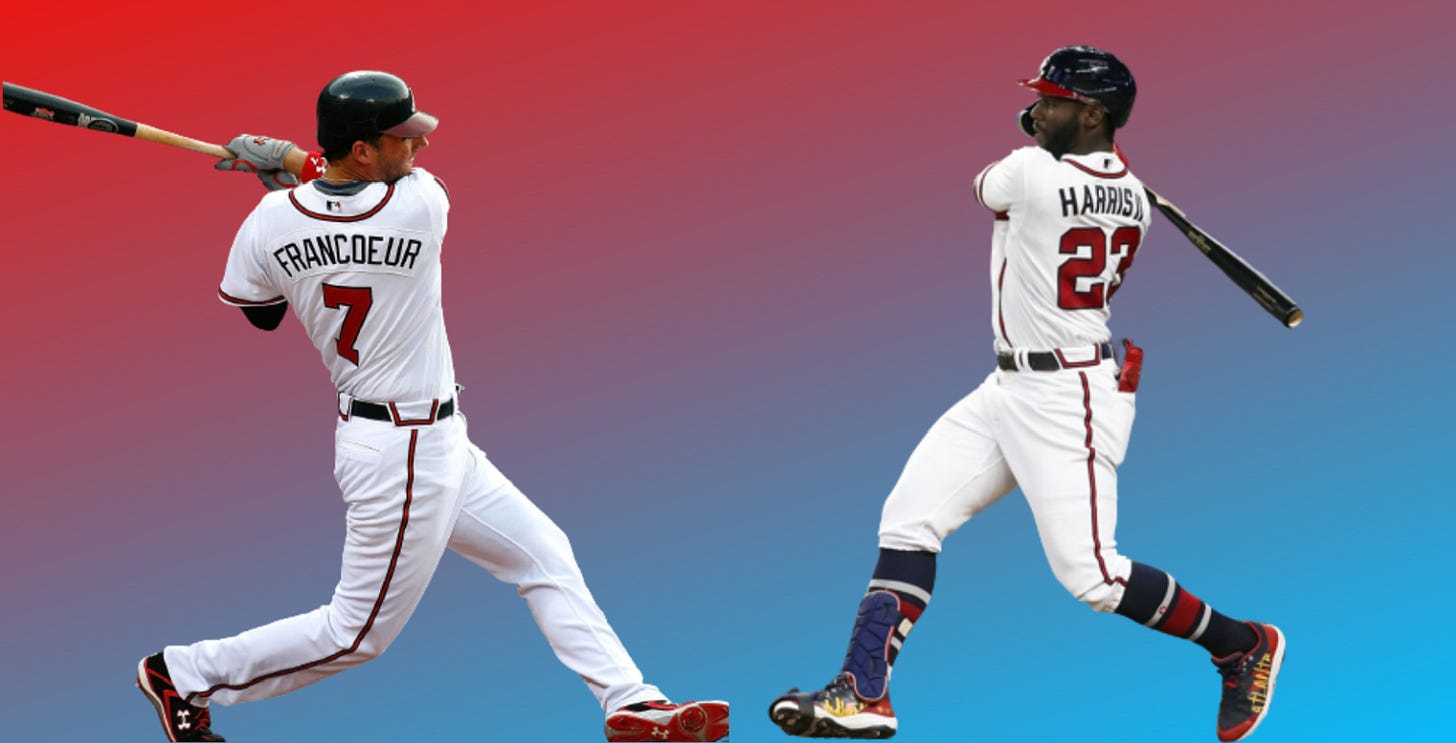Is Michael Harris II Following The Jeff Francoeur Career Path?
And is that a bad or good thing?
Although he’s picked up the hitting pace some recently — see his 3-for-4-with-a-HR performance against Detroit on Monday — 22-year-old Atlanta Braves outfielder Michael Harris II has been in a bit of a slump to start the 2023 season. In 44 games so far, Harris has a wRC+ of 65 (i.e., 35% worse than league average) at the plate, with an isolated power 24% worse than average. Those numbers are down from 36% and 40% above average, respectively, during a stellar debut season in 2022 that saw Harris win NL Rookie of the Year honors and establish himself as one of the sport’s young rising stars.
Harris’ recent uptick in play — his June OPS is 321 points higher than his season mark had been going into the month — may indicate he can return quickly to the form that made him so great as a rookie. But if the sophomore slump is real? Well, the Braves have also been through that before with a 22-year-old local prodigy who seemed like a lock for future stardom.
Seventeen years before Harris hit the scene with a bang, Atlanta-born Jeff Francoeur introduced himself to his hometown and the wider sports world with a similarly audacious rookie performance. Francoeur had a wRC+ of 127 in 70 games during the 2005 season, flashing power (an ISO 56% better than average) and defense in the outfield (+16 runs saved above average1) en route to 3.0 Wins Above Replacement in less than a half-season of work. This is also the obligatory part where I post Francoeur’s famous Sports Illustrated cover, which dubbed him “The Natural” roughly 40 games into his MLB career:
While Francoeur finished third in RoY voting behind Ryan Howard and Willy Taveras, he had established himself as the same type of toolsy phenom that Harris was last season. But also like Harris, Francoeur hit a speed bump on the road to stardom in his second big-league season. His wRC+ dropped from 127 to 84, his ISO fell from 56% above average to 11% above average, his defense slipped from +16 in right field to +6 (meaning his value was entirely erased by the positional adjustment) and his overall WAR sank from 3.0 to 0.6 despite playing 2.3 times as many games in 2006.
The shine had come off Francoeur’s rising star. And Harris is threatening a similar fate: His WAR has fallen from 5.0 in 114 games last season to a pace of 0.2 WAR per 162 team games this year. The sophomore slump can hit hard sometimes.
Beneath the surface-level comparisons, the commonalities between Harris and Francoeur’s games — and the weaknesses each contained — are surprising. As rookies, neither player had a walk rate within 40% of average, and both players struck out more than the league norm. They relied on power, defense and hitting for a solid batting average (despite not actually having a good line-drive rate) to propel their value. When those factors all regressed, a downturn was incoming.
The comparison doesn’t map perfectly, of course. Francoeur was more of a fly-ball hitter than Harris; Harris walks more, strikes out less and has a better OBP than Francoeur. Harris also plays more of a premium position (center field) than Francoeur did. But otherwise, it’s not hard to draw plenty of parallels between the Braves’ two Naturals in the outfield.
If Harris keeps following the Francoeur career plan, that would probably be pretty disappointing for him, the Braves and their fans. Though Francoeur bounced back to post 3.3 WAR in his third MLB campaign, he slid below replacement level in Years 4-5 before being shipped to the rival New York Mets straight-up for fourth-outfielder type Ryan Church — a fate unthinkable just a few seasons earlier. Out of all 42 batters to post between 2.5 and 3.5 WAR in a season at age 21, Francoeur’s 6.3 eventual career WAR ranks second-lowest, trailing only a player (Joe Nealon) who got career-ending tuberculosis the next year and died of typhoid pneumonia at age 25.
If that’s what it usually takes to derail a career this promising, then ending up with 6.3 lifetime WAR made Francoeur a pretty major disappointment. Yet, there was also a certain charm about Francoeur as both a player and a person. No less a genius than Jon Bois once called him “my favorite worst baseball player,” and I think that’s a great way to put it. You could do a lot worse than playing in the majors for 12 seasons, appearing in a World Series (with Texas in 2010), bouncing between teams that would win titles either shortly before or after (the Giants and the Royals), generally being regarded as a Beloved Clubhouse Guy, and then broadcasting for your hometown team in retirement.
But for Harris, there’s still time to become something much more. If he is finally healthy after missing 22 games earlier in the season, and he keeps up his recent turnaround form, Harris can leave the Francoeur career plan and avoid repeating the disappointments of Braves outfielders gone by. And if not? There’s always becoming somebody’s cult-favorite journeyman instead.
Filed under: Baseball
Averaging together the defensive metrics found at FanGraphs and Baseball-Reference.







